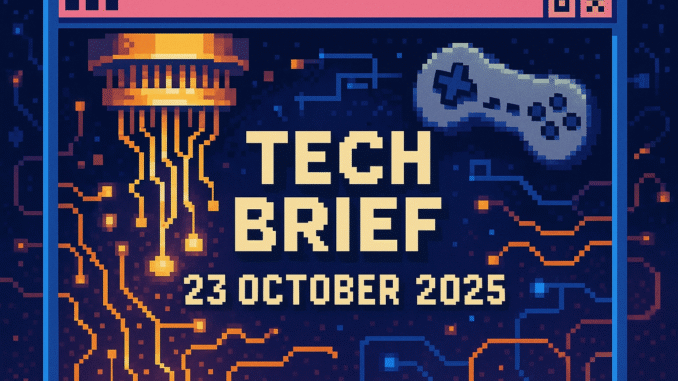
“Tech Brief 23 October 2025” arrives on a milestone day, where new browser ambitions, quantum leaps, and a farewell to a game industry icon all shape the conversation. Big moves in AI, a quantum computing first, and a Midlands tech homecoming each claim the spotlight.
Missed yesterday’s Tech Brief? Catch up here before diving in.
Stoke-on-Trent Institute of Technology Opens Its Doors
“What keeps a local tech scene alive outside London?” The Midlands has an answer. The Stoke-on-Trent and Staffordshire Institute of Technology offers everyone a glimpse inside this Thursday from 5:30pm to 8pm. More than just another open evening, it is a regional statement. Britain’s tech power was never just about city skyscrapers, it is rooted in grassroots spaces, from hackspaces to high streets.
Here, a new generation steps up, surrounded by legacy. The Institute sits in a region long associated with hardware tinkering and DIY computing clubs. The local focus recalls Amstrad, Sinclair, and DIY user groups where curiosity came first, not the postcode. For those interested in digital skills or seeking new community, this is a chance to see progress up close.
Thursday’s event is a reminder: innovation is as likely to spark beside the Trent as in any global capital.
Google Claims Quantum Superiority with Latest Computer Breakthrough
No hyperbole here; this week, Google’s quantum team says they have solved a molecular challenge impossible for any traditional supercomputer. Using its advanced quantum computer, Google modelled specific chemical interactions, which matters for new medicines and advanced materials. While nobody is downloading quantum apps yet, the technical accomplishment is real, not just laboratory theatre.
The buzzword is “quantum supremacy,” that moment when quantum devices do what silicon cannot. Achieving this with practical science is a shift from the sci-fi dreams the 1980s promised. Scientists note real-world impact is still years away, but the landscape has changed.
Anyone who watched processing speeds double in the 90s may feel that old excitement. Today, it’s quantum gates and molecular simulations, not MHz or RAM. Is your next prescription coming from a quantum lab? Too soon to say, but the race is on.
OpenAI Launches ChatGPT Atlas: The Browser Grows Up
A single browser update is rarely newsworthy, but OpenAI just released ChatGPT Atlas. This browser is shaped around its AI assistant, offering direct, “conversational” interactions as you browse. It is not just about replacing your favourites tab or blocking pop-ups. Atlas reimagines the web: integrated AI, search handled by chat, and information mashed up on the fly.
Will it stick, or is it the latest player in a browser war that started with floppy installs? There is tension. Tech veterans recall the first Netscape downloads, when companies fought for the role of “default browser.” Atlas may call back that era, but aims higher, remaking how users even think about browsing.
With Google investing in quantum, and OpenAI attacking browser norms, the real question is who gets to shape our next daily tech rituals.
Tomonobu Itagaki: Industry Mourns a Gaming Outsider
Some careers change gaming forever. Tomonobu Itagaki, the outspoken force behind Ninja Gaiden and Dead or Alive, has died at 58. “A force of nature who took no prisoners,” that’s how former Team Ninja colleagues described him, citing his uncompromising creative process.
His designs stood apart, demanding real tenacity from players. In the tradition of the hardest 8-bit classics, Itagaki’s hits rarely played fair but earned devoted fans. Colleagues say he challenged publisher conventions and stuck to his vision even under pressure. Just like so many British indie devs working from box bedrooms with scant support, Itagaki proved defiance is sometimes the best innovation engine.
His legacy is found wherever a game dares to punish and reward equally, hard, offbeat, and unforgettable.
From the Wayback Machine
On This Day: 1983: Apple releases the Lisa, bringing Xerox PARC’s GUI concepts to the commercial market after the Xerox Star paved the way. Though it wasn’t the pioneer, the Motorola 68000-powered Lisa included multitasking, a mouse, and overlapping desktop windows. Despite its eye-watering £6,500 price tag (roughly $10,000 then) and short lifespan (barely 10,000 units sold), Lisa’s features laid the groundwork for the Macintosh and modern desktops. The ideas behind its windowed desktop and document-based workflow now live inside every modern OS, even as few ever touched an actual Lisa. Pricey risks have a way of shaping what comes next.
What This Means
Tech Brief 23 October 2025 asks us why “defaults” really matter. From quantum leaps with hidden timelines to an old-school browser clash, today’s tech fights are shaped by visionaries, and the regions and cultures that back them. It is always the next experiment and always the latest open door.
Tune in tomorrow, bring your quirks, and never underestimate the power of a Midlands user group meeting.
Missed yesterday’s Tech Brief? Catch up here

Leave a Reply